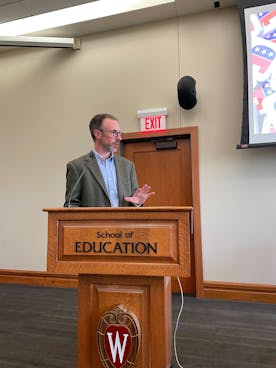Political experts discussed 2024 presidential contenders and the Republican Party’s shifting landscape during a Thursday afternoon panel with the University of Wisconsin-Madison’s Elections Research Center.
Elections Research Center Director Barry Burden, who moderated the event, said hosting the Road to the 2024 GOP Presidential Nomination on UW-Madison’s campus is important because of the youth vote in Wisconsin, a swing state that could be the electoral “tipping point” in the 2024 presidential election.
The last two presidential elections in Wisconsin were decided by roughly 20,000 votes out of about three million total votes cast, Burden said, which means students “acting together” could strongly impact who wins the presidency in 2024.
“Half of the Kohl Center would be enough to change the outcome of the statewide election,” Burden told The Daily Cardinal ahead of the event.
Panelists included The New York Times reporter Reid Epstein, Marquette University political science professor Julia Azari, Republican campaign strategist Liz Mair and political consultant Josh Putnam of Frontloading HQ.
Mair emphasized that Trump’s popularity in the 1980s and 1990s “helped raise [his] name ID sky high,” and that his TV show “The Apprentice” put him “in everybody’s living room.”
“You cannot overestimate the importance of name recognition,” Azari said. “Trump has proven to be what I'd like to call a ‘coordination point’ in a party that's otherwise really collapsing under its own anti-establishment weight.”
The experts agreed the 2024 election will likely, though not certainly, be another battle between Biden and Trump. Florida Gov. Ron DeSantis is the most likely challenger, the panelists said.
Burden said Trump’s frontrunner status was rare following his loss in the 2020 presidential election, noting there was “no chance” Republicans would have renominated John McCain after he lost in 2008 or Mitt Romney after 2012.

Barry Burden, founding director of UW-Madison's Elections Research Center, speaks at the panel.
Azari said Trump’s shadow loomed over the party during the August GOP presidential debate despite the former president’s decision to skip the event.
Some candidates, like former New Jersey Gov. Chris Christie and former Arkansas Gov. Asa Hutchinson, were solidly “anti-Trump,” she said. Others, like Mike Pence and former South Carolina Gov. Nikki Haley, are “Trump-lite,” while entrepreneur Vivek Ramaswamy and DeSantis fall into the “Trump-plus” category, Azari said.
Milkwaukee’s Fiserv Forum hosted the debate and will host the Republican National Convention next July.
At least 59% of Republican voters support Trump as their first choice, according to a Sept. 2 Wall Street Journal poll. A majority of respondents also believed Trump’s four criminal indictments were politically motivated, including charges accusing Trump and his allies of conspiring to steal electoral votes from President Biden after the 2020 election.
Panelists also spoke to growing fissures within the Republican Party, noting GOP stances on hot-button issues like abortion have pushed some independent voters toward the Democratic Party.
That includes a nationwide group of “swinging moderate” suburbanites that Epstein noted might live in a Milwaukee suburb like Brookfield or Mequon.
“[They] fled the Republican Party during the era of Trump, and there's not a great deal of evidence that they are coming back,” Epstein said.
The Democratic National Committee’s shuffled presidential primary calendar differentiates this race from past ones, Putnam said. In February, the committee voted to push back voting in historically early states such as New Hampshire and Iowa and move up states like South Carolina, Nevada, Georgia and Michigan.
“You've got this elongated beginning similar to 2012, and what that does is deprive other candidates of something to hang their hat on,” Putnam said. “Instead, they have to spend their time saying, ‘give me a little bit more money so we can make it to Super Tuesday.’”
The next Republican debate is on Sept. 27 in Simi Valley, California. Trump is unlikely to attend based on statements from Donald Trump, Jr. at the first debate in Milwaukee.
Rachel Hale is a senior staff writer who covers state politics and campus events. Before getting involved with The Daily Cardinal, she was a culture editor at Moda Magazine. Follow her on Twitter at @rachelleighhale.






